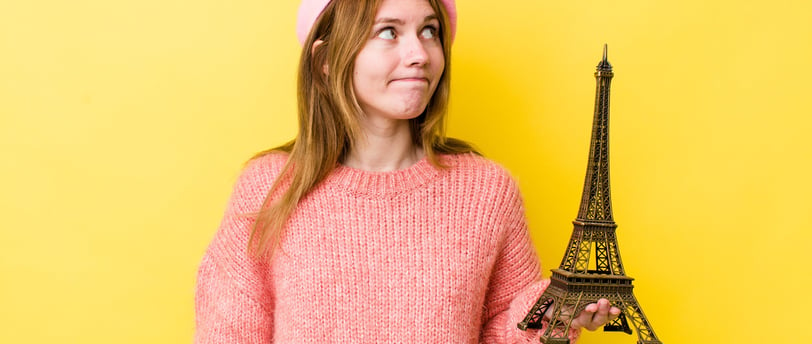Why ‘Couci-Couça’ Is Not a Thing: Real French Expressions You’ll Actually Use Instead
If you’ve ever cracked open a French textbook, you’ve probably been taught to say “couci-couça” when you’re feeling “so-so.” Here’s the thing: no one actually says that in France. Not ever. Let’s toss the clichés and dive into real-life French you’ll hear.
[BEGINNERS] ESSENTIAL FRENCH
11/12/20243 min read


When I meet a new class or start a new online course, most students are excited to throw out the phrases they’d learned in their textbooks as children. Bonjour ! Comment ça va ? Couci-couça !
The truth is, couci-couça is one of those expressions that’s technically correct but practically nonexistent. It’s like pulling out “hark” or “forsooth” in casual English conversation—it’s just not happening. So, if not couci-couça, what do the French actually say when they’re feeling “meh”?
Here are three real expressions that you can start using right away.
1. Bof – The Ultimate French Shrug in a Word
If there’s one word that sums up the French love of understatement, it’s bof. Short, simple, and versatile, this little gem is the go-to response when you’re feeling unimpressed, uninspired, or just plain mediocre.
How to use it:
Someone asks you how you’re doing ("comment ça va ?"), and you’re not feeling great but not terrible either? Just shrug and say, “Bof.” Want to give a lukewarm review of a movie or a meal? Bof works there too.
Why it’s brilliant:
It’s not just a word; it’s an attitude. The accompanying shrug or facial expression does half the work. Bof captures a vibe that’s uniquely French: a mix of indifference and honesty that textbooks can’t teach.
2. Ça va... – It’s All in the Intonation (and in the suspension points)
You’ve probably heard ça va a million times—it’s the classic French phrase for both the question “How’s it going?” or the answer, “I’m fine.” But what you might not realize is that ça va is incredibly nuanced. Depending on how you say it, it can convey anything from “I’m fantastic” to “I’m barely hanging on.”
Examples of tone in action:
Bright and upbeat: “Ouais, ça va !” = “Yeah, I’m doing great!”
Flat and neutral: “Ça va.” = “I’m okay.”
Hesitant or with a sigh: “Euh… ça va...” = “I guess I'm good.”
Why it’s genius:
The simplicity of ça va makes it a blank canvas for your mood. Pair it with the right tone, a smile, or even a sigh, and you’ve got a complete answer that’s authentic and perfectly French.
3. Ça fait aller – The Subtle Art of Getting By
If you’re in a bit of a slump but managing to push through, ça fait aller is the phrase for you. Translating loosely to “It’s going” or “I’m managing,” this expression is understated but honest.
How to use it:
Let’s say someone asks how you’re doing during a stressful week. Instead of defaulting to ça va, you can say, “Oh, ça fait aller.” It’s a modest, slightly resigned way of saying, “I’m coping.” Personally, I associate this expression with my grandmother, who wasn't the most enthusiastic of women, and who would systematically reply “ça fait aller” when talking about her daily struggles.
Why it’s useful:
Ça fait aller works fine for those in-between moments when life isn’t great but isn’t awful either. Although perhaps a little old-fashioned?
To hell with the couci-couças!
Learning a language is about more than just words; it’s about understanding the culture and context behind them. The French value honesty and subtlety in conversation, which is why outdated textbook phrases like couci-couça don’t cut it. Real-life French is all about nuance and tone. Next time someone asks how you’re doing in French, skip the clichés. Whether you’re feeling bof, ça va, or just ça fait aller, you’ll sound natural and confident.
And remember: language is constantly evolving! So stay in touch with today's language by watching series on Netflix, for example, or taking conversation classes.
Clémence PARIS
Langue et communication
Contact
© 2024. All rights reserved.
Legal notices
General conditions of sale
Data protection
E.I Clémence Paris Langue et Communication
SIREN 934 245 812
SIRET 93424581200011
TVA INTRACOMMUNAUTAIRE : FR 48934245812
